- TECHSWU
- Posts
- TECHSWU #74
TECHSWU #74
Welcome to TECHSWU, your go-to destination for all things tech that matter in your daily life!



Brooklyn-based company Tarform is looking to bring sustainable motorcycles to the mainstream with its electric model, the Vera. Inspired by Tesla's mission to bring eco-friendly cars to the market, the Vera combines classic motorcycle aesthetics with a modern twist.
The design is sleek and sophisticated, with clean lines and sculpted bodywork, while the lightweight build promises agility and maneuverability. The electric motor allows the bike to accelerate from 0 to 60 mph in just 3.
5 seconds, with a top speed exceeding 85 mph. The Vera also boasts a 100-mile range on a single charge, making it ideal for everyday commutes and weekend getaways.
With a starting price of $16,000, the Vera aims to make electric motorcycles more accessible and affordable to a wider range of riders.

In an article published by The New York Times, it has been revealed that Elon Musk, the billionaire founder of SpaceX, has volunteered his own sperm to help seed a colony on Mars. Musk, who already has 12 children on Earth, is committed to establishing a colony on the red planet within this generation.
While NASA does not expect to land humans on Mars until the 2040s, Musk believes it will take less than 10 years to send people there. He has put his employees to work for more than 100 hours a week, designing every element necessary for sustaining life on Mars, including habitats, spacesuits, and even child-rearing techniques.
Musk has long been interested in bioengineering organisms better suited for life on Mars. This pronatalist ideology, shared by Musk and others in Silicon Valley, stems from concerns about underpopulation.
Musk has previously warned of an "underpopulation crisis" on Earth, though declining fertility rates and an increasing global population suggest otherwise.


In a surprising firmware update, DJI has given Apple Watch owners the ability to control their gimbals remotely. The update allows users to adjust the gimbal's angle, enable ActiveTrack, switch between portrait and landscape modes, and even view the camera feed on the Apple Watch.
The update also brings improvements to the ActiveTrack 6.0 system, allowing it to follow subjects and keep them in frame even if they briefly disappear behind objects.
To access these features, users will need a compatible Apple Watch model and an operating system of watchOS 9 or later. There are no restrictions on which iPhone generation can be used, as long as it is running iOS 16 or later and is paired with the Osmo Mobile 6 or Osmo Mobile SE.
The DJI Osmo Mobile 6 is currently at the top of the best smartphone gimbals guide, and this new feature is sure to enhance its appeal.


According to a new report from data-analysis firm Technavio, global spending on retail automation is predicted to grow by nearly $12 billion from 2024-2028. The report highlights that the increasing adoption of cloud-based solutions is driving this growth, as it allows merchants to integrate more back-end software in the cloud, resulting in seamless access to customer and product data across multiple platforms.
Additionally, the report emphasizes the role that artificial intelligence (AI) will play in retail, revolutionizing demand forecasting, enhancing the customer experience with personalized campaigns, and improving supply-chain management. However, the report also warns retailers to be mindful of privacy and security concerns associated with using high-tech solutions.
Overall, while retail automation presents significant growth opportunities, concerns about safety, identity theft, and breaches in personal bank accounts could hinder market growth.

Xiaomi has announced the opening of its new Smart Factory, where robots and AI work together to manufacture high-end smartphones. The factory, located in Beijing, features specialized hardware and software that allows Xiaomi to automate the entire manufacturing process.
Humans are only present to supervise the AI, which can manage operations and find solutions to problems it encounters. The factory has 11 production lines and can manufacture 10 million smartphones annually, with one smartphone being produced every three seconds.
The AI platform used by Xiaomi, called Xiaomi Pengpai Intelligent Manufacturing Platform, has self-perception, self-decision-making, and self-execution capabilities. It can diagnose equipment problems, improve process flows, and manage the entire production process from raw material procurement to delivery.
The Smart Factory is expected to significantly speed up production while ensuring quality and precision.

The Tesla Cybertruck has become a phenomenon, captivating tech geeks and attracting attention on social media. Tallahassee became home to two Cybertrucks, owned by John Fabrega and Carl Fuqua, who connected through a Facebook group for Cybertruck owners.
Both men acknowledged the truck's unconventional appearance but were drawn to its features and functionality. Although they initially thought the truck was ugly, they were intrigued by its innovative technology.
The Cybertruck Foundation Series model, which they both purchased, costs $102,235 new. The truck's unique features include a flatulence sound made through its Toybox feature, a spacious five-seat interior, and hidden gems like the 'frunk' and power outlets in the trunk bed.
Despite its unconventional appearance, the Cybertruck is functional, with a towing capacity of 11,000 pounds and the ability to haul construction materials. Tallahassee now has six Supercharger stations, and a Tesla Service Center is being established in the city.

.jpg?w=1200&h=675&auto=format%2Ccompress&fit=max&enlarge=true)
In this article, the author explores the future of wearable technology and the trends and predictions for 2024. They highlight the evolution of wearable tech from basic fitness trackers to sophisticated smartwatches and health monitoring devices.
The article goes on to discuss five key trends and predictions for 2024, including advanced health monitoring, the integration of AI and machine learning, expansion in healthcare, enhanced connectivity and interoperability, and sustainable designs. The author explains how these advancements will impact various aspects of daily life, such as health and fitness, convenience and efficiency in smart homes, workplace productivity and safety, and communication and collaboration in various industries.
However, the article also acknowledges the challenges that need to be addressed, such as privacy and security concerns and battery life. Overall, the future of wearable tech looks bright, promising a more connected, personalized, and health-focused world.
In an opinion piece for the Detroit Free Press, Bella Bakeman laments how artificial intelligence on Instagram is ruining the experience for artists and fans alike. Bakeman, an Instagram addict herself, argues that the proliferation of AI "art" on the platform is essentially plagiarism.
Real artists invest hours of work and effort into their creations, only to have their art hidden and overshadowed by AI-generated content. Moreover, Instagram seems to have no issue with promoting AI artists, which is a disservice to the talented individuals who put their heart and soul into their work.
Bakeman also highlights how this issue goes beyond Instagram, with platforms like Meta (formerly Facebook) claiming the right to use anything posted on their platforms, effectively stealing artists' intellectual property. In the end, the bookish community suffers, as artists leave these platforms and book sales plummet along with them.
Bakeman urges companies to carefully consider the ethics of using AI in their programming, before it's too late

Are you in need of some tech inspiration? Look no further! Lifehacker has compiled a list of their favorite tech influencers to follow on YouTube. These YouTubers provide high-quality unboxing videos, deep dives, and reviews of the latest phones, tablets, computers, and gaming devices.
Marques Brownlee, also known as MKBHD, is a top choice for all things phones, tablets, and wearables. Linus Tech Tips covers the geekier side of tech in an approachable way, while Gamers Nexus focuses on in-depth performance analysis and ethics in the tech industry.
Unbox Therapy is dedicated to unboxing videos, while Dave2D offers clean and comprehensive coverage of a wide range of tech topics. Digital Foundry is the go-to for analyzing game performance, and LGR explores the odd and nostalgic side of tech.
Lastly, Technology Connections explains the history and methodology behind home appliances in a fun and educational way. With these influencers in your feed, you'll never miss out on the latest tech trends and reviews.

Apple is reportedly increasing the manufacturing of its iPhone 16 series by 10%, with the aim of shipping over 90 million units by the end of the year. The company is confident about its new release and will try to create a "need" for users to buy the iPhone 16 by marketing it in a way that highlights its Apple Intelligence features.
Apple announced Apple Intelligence with a range of AI features in iOS 18 during the WWDC 2024. Currently, only the iPhone 15 Pro and Pro Max are compatible with Apple Intelligence, but many users may want to upgrade to the iPhone 16 to experience it.
Apple hopes to leverage Apple Intelligence to boost iPhone 16 sales and achieve its manufacturing goal. Only time will tell if the strategy will be successful.

According to a report from hospitality intelligence provider Knowland, sports tourism is driving the growth of meetings and events in Las Vegas. The city led the top 25 US markets for year-over-year event volume growth in June, with a 22% increase in meetings volume.
This growth was primarily fueled by events related to the NHL draft. The report also found that Las Vegas had the highest events growth in May as well.
Other cities that experienced significant growth in meetings and events in June included St. Louis, Nashville, Orlando, and Tampa-St.
Petersburg. The rise in sports tourism can be attributed to the increasing interest in experiential travel.
Las Vegas' success in attracting sports-related meetings and events bodes well for the city's tourism industry.

Swiss luxury watchmaker H. Moser & Cie.
has embraced emerging technologies like non-fungible tokens (NFTs) and virtual reality to enhance its product offerings. The company's Genesis project incorporates Web3 technologies to create a complete ecosystem that combines the physical and digital realms.
Customers receive a physical watch that is augmented with a digital product passport (DPP) and NFTs, providing access to exclusive brand experiences and increasing resale value. The DPP stores information about the watch's journey, such as production, ownership, and servicing history, while the NFTs unlock virtual metaverse spaces and represent insurance coverage for both the physical and digital aspects of the watch.
H. Moser & Cie.
plans to deploy these features to more watches in its collection and is committed to embracing new possibilities to benefit its customers.

